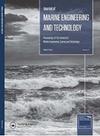Consumption-reduced manual and automatic manoeuvring with conventional vessels
IF 2.6
4区 工程技术
Q1 Engineering
Journal of Marine Engineering and Technology
Pub Date : 2022-12-13
DOI:10.1080/20464177.2022.2154666
引用次数: 3
Abstract
Conventional ships are rarely the focus of research projects on autonomous shipping. Nevertheless, the shipping companies are very interested in reducing fuel consumption. This paper proposes a gradual approach towards ship automation which starts with the intelligent assistance of common manual steering by means of a Maneuver Assistance System (MAS). The MAS displays a manually improved manoeuvre plan and the future motion based on the current actuator commands. These two assistance functions contribute to a more conscious use of actuators which can significantly reduce power consumption. For further automation, the improved manoeuvre plan is converted into a trajectory by forward simulation, which is then used by a control system. The control system includes feed-forward and feedback control as well as an allocation system based on a simplified dynamic motion model. A cascaded structure is used, where an outer track controller provides velocity and heading commands to an inner velocity and heading controller. The paper presents the necessary framework and the application of this approach to the digitised German research vessel DENEB with the aim to gradually introduce and realise automatic manoeuvring. Results from manual and assisted manoeuvres with the DENEB are analysed and compared. Finally, first results of automatic berthing with the vessel in the port of Rostock are presented.使用传统船舶减少手动和自动操纵的消耗
传统船舶很少成为自主航运研究项目的重点。然而,航运公司对减少燃料消耗非常感兴趣。本文提出了一种逐步实现船舶自动化的方法,该方法从机动辅助系统(MAS)对普通手动操舵的智能辅助开始。MAS显示手动改进的机动计划和基于当前执行器命令的未来运动。这两个辅助功能有助于更有意识地使用执行器,这可以显着降低功耗。为了进一步实现自动化,改进的机动计划通过前向仿真转换为轨迹,然后由控制系统使用。控制系统包括前馈和反馈控制以及基于简化动态运动模型的分配系统。采用级联结构,其中外部轨道控制器向内部速度和航向控制器提供速度和航向命令。本文介绍了该方法在数字化德国科考船DENEB上的必要框架和应用,旨在逐步引入和实现自动操纵。结果从手动和辅助机动与DENEB进行了分析和比较。最后,介绍了该船在罗斯托克港自动靠泊的初步结果。
本文章由计算机程序翻译,如有差异,请以英文原文为准。
求助全文
约1分钟内获得全文
求助全文
来源期刊

Journal of Marine Engineering and Technology
工程技术-工程:海洋
CiteScore
5.20
自引率
0.00%
发文量
0
审稿时长
>12 weeks
期刊介绍:
The Journal of Marine Engineering and Technology will publish papers concerned with scientific and theoretical research applied to all aspects of marine engineering and technology in addition to issues associated with the application of technology in the marine environment. The areas of interest will include:
• Fuel technology and Combustion
• Power and Propulsion Systems
• Noise and vibration
• Offshore and Underwater Technology
• Computing, IT and communication
• Pumping and Pipeline Engineering
• Safety and Environmental Assessment
• Electrical and Electronic Systems and Machines
• Vessel Manoeuvring and Stabilisation
• Tribology and Power Transmission
• Dynamic modelling, System Simulation and Control
• Heat Transfer, Energy Conversion and Use
• Renewable Energy and Sustainability
• Materials and Corrosion
• Heat Engine Development
• Green Shipping
• Hydrography
• Subsea Operations
• Cargo Handling and Containment
• Pollution Reduction
• Navigation
• Vessel Management
• Decommissioning
• Salvage Procedures
• Legislation
• Ship and floating structure design
• Robotics Salvage Procedures
• Structural Integrity Cargo Handling and Containment
• Marine resource and acquisition
• Risk Analysis Robotics
• Maintenance and Inspection Planning Vessel Management
• Marine security
• Risk Analysis
• Legislation
• Underwater Vehicles
• Plant and Equipment
• Structural Integrity
• Installation and Repair
• Plant and Equipment
• Maintenance and Inspection Planning.
 求助内容:
求助内容: 应助结果提醒方式:
应助结果提醒方式:


